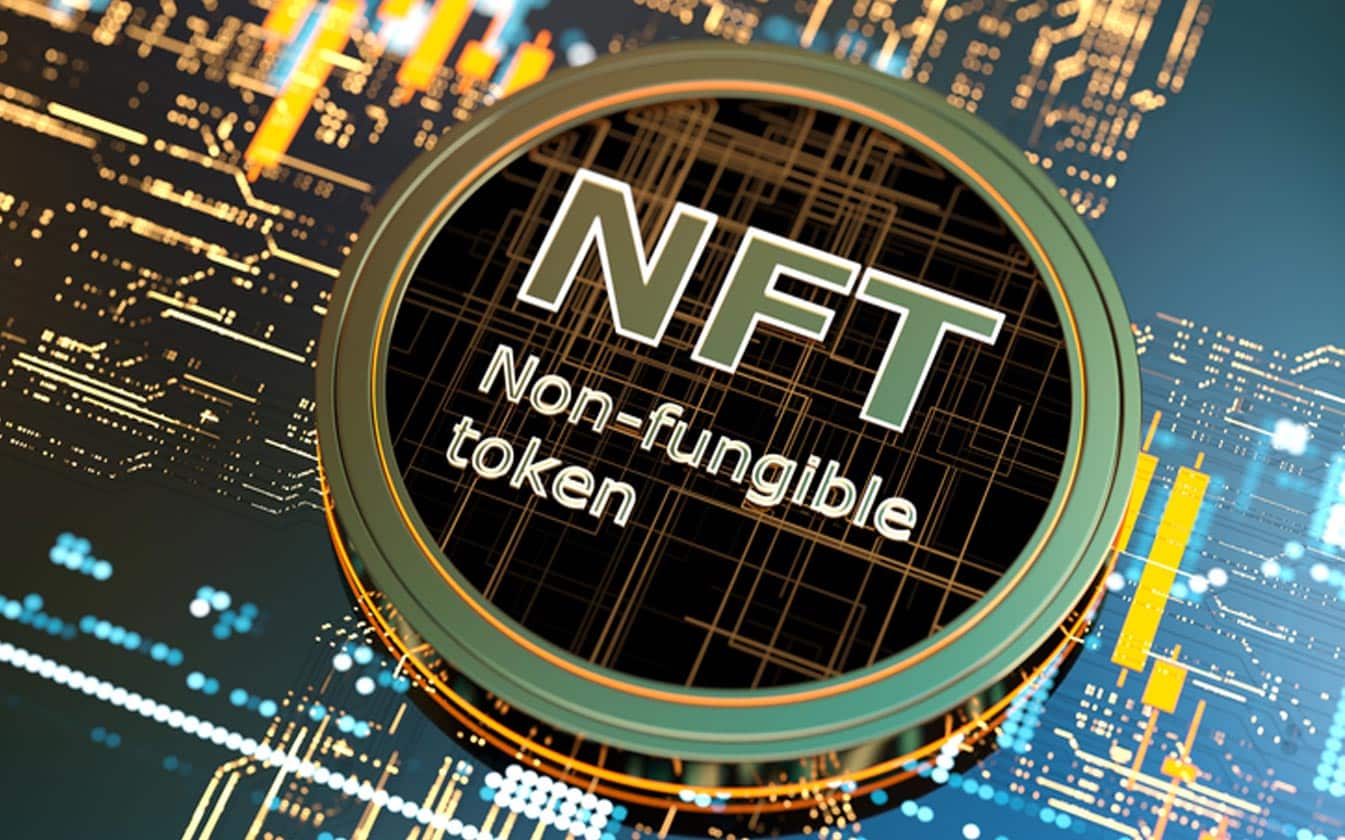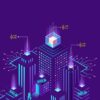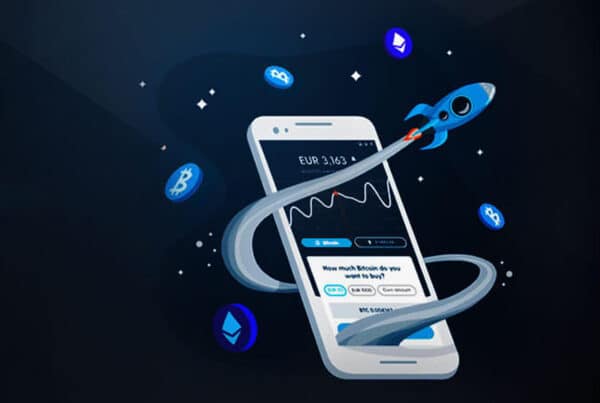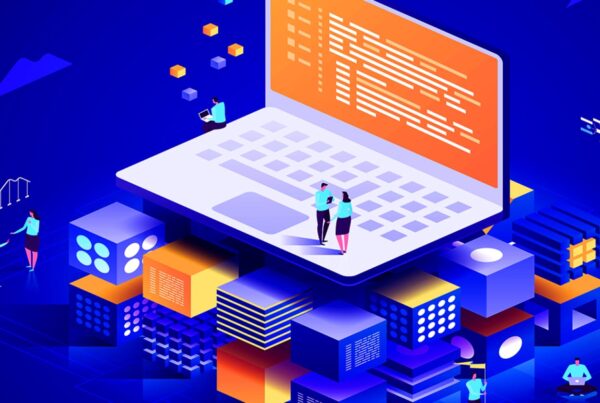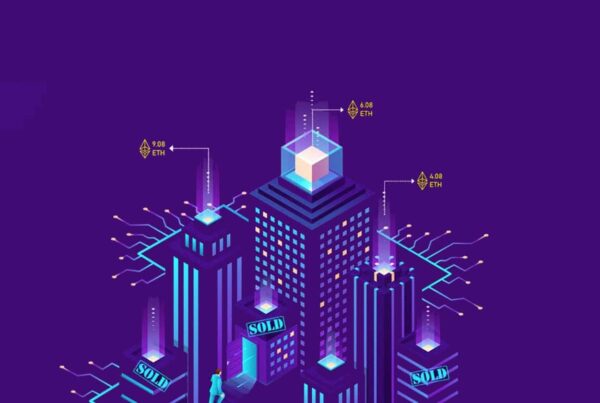Table of Contents
Toggle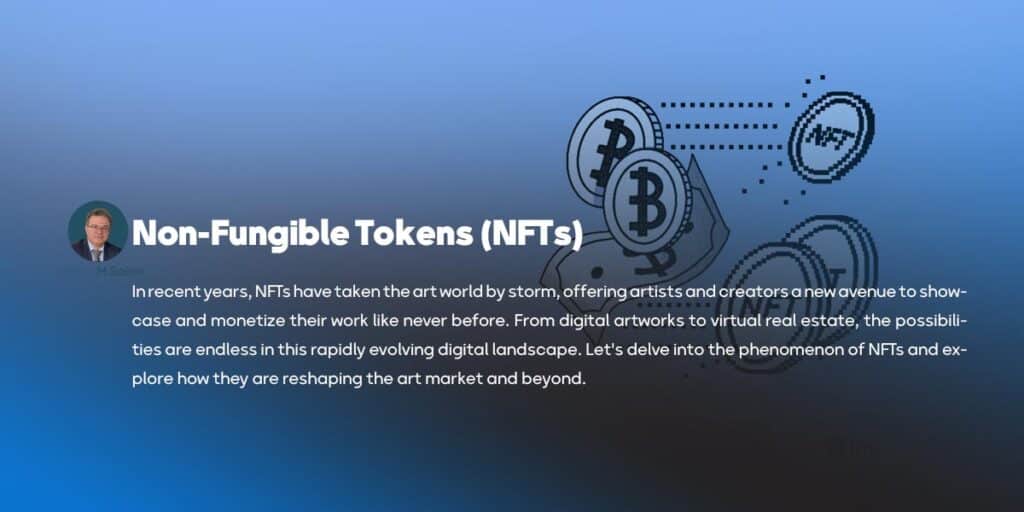
In recent years, NFTs have taken the art world by storm, offering artists and creators a new avenue to showcase and monetize their work like never before. From digital artworks to virtual real estate, the possibilities are endless in this rapidly evolving digital landscape. Let’s delve into the phenomenon of Non-Fungible Tokens and explore how they are reshaping the art market and beyond.
Introduction of NFT
NFT stands for Non-Fungible Token, which represents a unique digital asset or collectible on a blockchain. Unlike cryptocurrencies such as Bitcoin or Ethereum, which are fungible and interchangeable, each NFT has a distinct value and specific attributes that set it apart from any other token.
Non-Fungible Tokens are commonly used to tokenize digital artworks, music, videos, virtual assets, and even real-world items, providing proof of ownership and authenticity in the decentralized digital space.
By leveraging blockchain technology, NFTs have enabled artists and creators to monetize their work, while collectors and enthusiasts can own verifiable and scarce digital items in a transparent and secure manner.
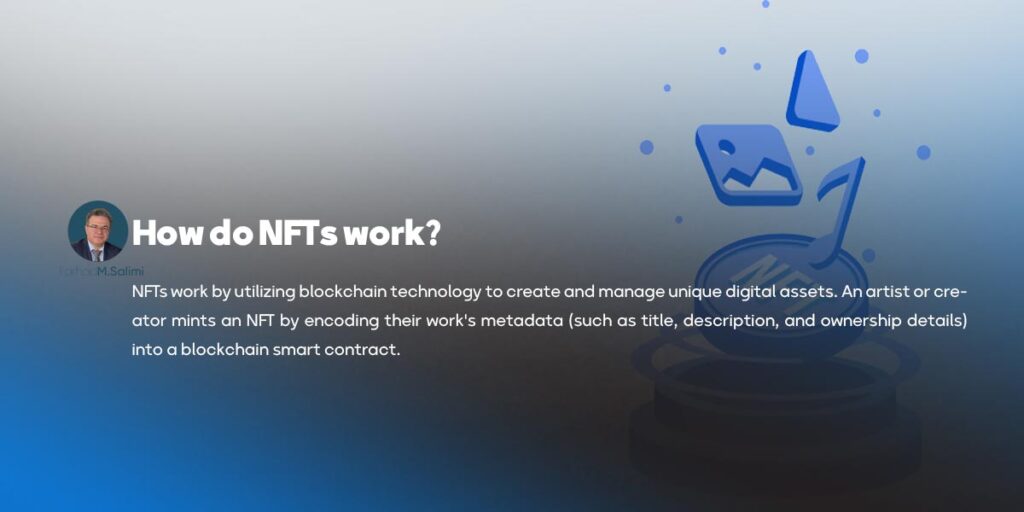
How do NFTs work?
NFTs work by utilizing blockchain technology to create and manage unique digital assets. An artist or creator mints an Non-Fungible Tokens by encoding their work’s metadata (such as title, description, and ownership details) into a blockchain smart contract.
- Ownership: Once minted, the Non-Fungible Token is assigned a unique identifier that distinguishes it from other tokens. This identifier is permanently stored on the blockchain, validating ownership and authenticity.
- Transfers: Non-Fungible Tokens can be bought, sold, and traded on various online marketplaces or platforms that support Non-Fungible Token transactions. Each transfer is recorded on the blockchain, providing a transparent and immutable transaction history.
- Interoperability: Non-Fungible Tokens can represent various digital assets like art, music, virtual real estate, collectibles, etc. The standardization of NFTs enables interoperability across different platforms and ecosystems.
- Scarcity and Value: The scarcity and uniqueness of an Non-Fungible Token, combined with the proof of ownership guaranteed by the blockchain, contribute to its perceived value in the digital marketplace.
Overall, NFTs facilitate the creation, ownership, and exchange of digital assets in a decentralized and secure manner, opening up new possibilities for artists, collectors, and enthusiasts in the digital space.
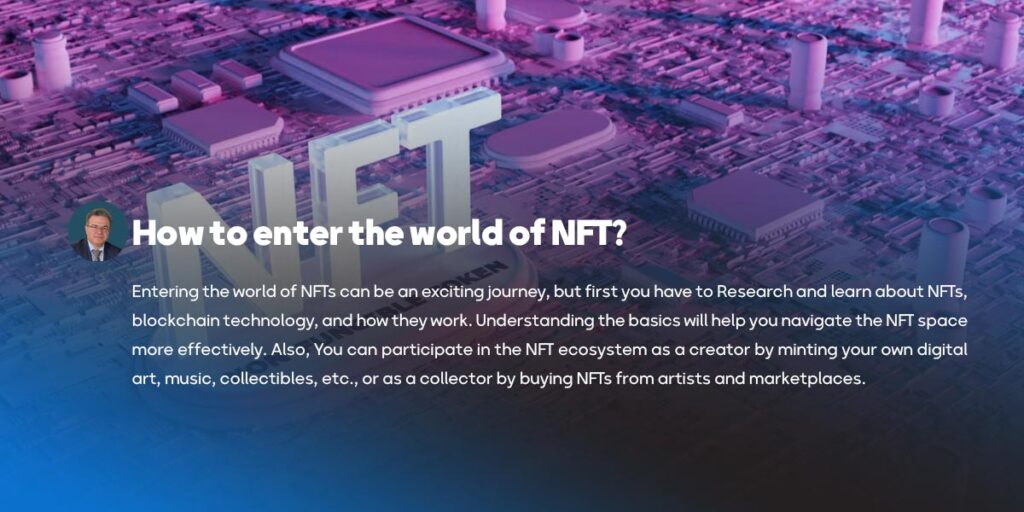
How to enter the world of Non-Fungible Tokens?
Entering the world of NFTs can be an exciting journey, but first you have to Research and learn about Non-Fungible Tokens, blockchain technology, and how they work. Understanding the basics will help you navigate the Non-Fungible Token space more effectively. Also, You can participate in the Non-Fungible Token ecosystem as a creator by minting your own digital art, music, collectibles, etc., or as a collector by buying Non-Fungible Tokens from artists and marketplaces.

Choose a Platform
Explore popular NFT platforms like OpenSea, Rarible, and Foundation to mint, buy, or sell Non-Fungible Tokens. Each platform may have its own features, community, and fees.
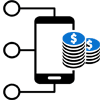
Wallet Setup
Set up a cryptocurrency wallet that is compatible with the platform you choose. This wallet will store your Non-Fungible Tokens and enable you to make transactions securely.

Participate in Communities
Join Non-Fungible Token communities, forums, and social media groups to connect with fellow creators, collectors, and enthusiasts. Engaging with the community can help you learn, network, and discover new opportunities.

Stay Informed
Keep up with the latest trends, news, and developments in the Non-Fungible Token space to make informed decisions and adapt to changes. The NFT market is dynamic and evolving rapidly.
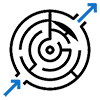
Start Small
If you’re new to Non-Fungible Tokens, consider starting with smaller investments or creations to gain experience and confidence in the space.
Remember, the world of Non-Fungible Tokens is diverse and constantly evolving, so don’t hesitate to explore, experiment, and have fun as you navigate this exciting digital landscape.
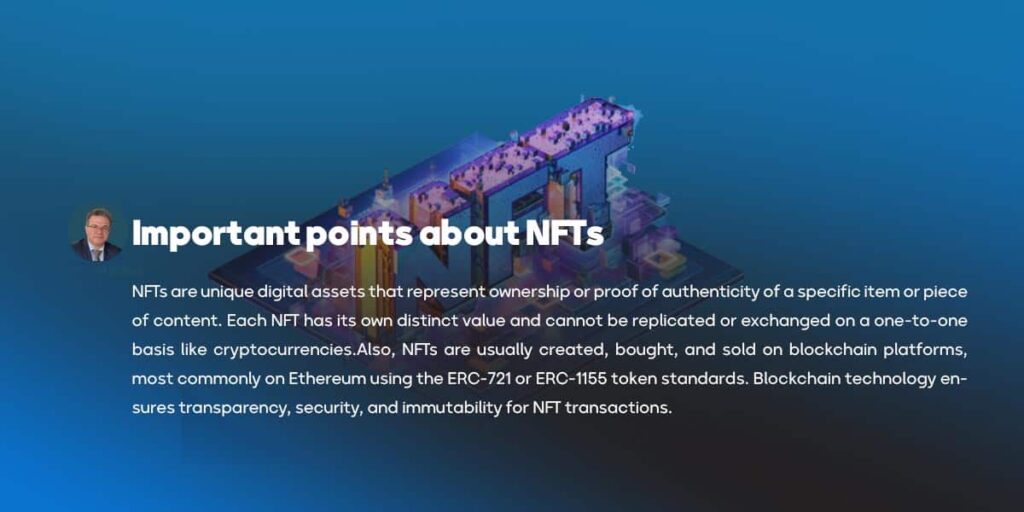
Important points about NFTs
NFTs are unique digital assets that represent ownership or proof of authenticity of a specific item or piece of content. Each Non-Fungible Token has its own distinct value and cannot be replicated or exchanged on a one-to-one basis like cryptocurrencies.Also, Non-Fungible Tokens are usually created, bought, and sold on blockchain platforms, most commonly on Ethereum using the ERC-721 or ERC-1155 token standards.
Blockchain technology ensures transparency, security, and immutability for Non-Fungible Tokens transactions.

Ownership and Rights
Owning an Non-Fungible Tokens typically grants the buyer ownership of the digital asset itself, but not necessarily intellectual property rights or copyrights associated with the underlying content. Terms of ownership should be carefully reviewed.
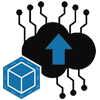
Digital Collectibles
NFTs are often used to tokenize digital art, collectibles, in-game items, music, video clips, and other digital creations. They enable creators to monetize their work and offer collectors a means to own unique digital items.
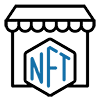
Marketplaces
NFT marketplaces like OpenSea, Rarible, and Mintable provide platforms for creators to mint Non-Fungible Tokens, list them for sale, and for collectors to browse, buy, and trade Non-Fungible Tokens. Each marketplace may have its own features, communities, and fee structures.

Environmental Concerns
The energy consumption and environmental impact of blockchain networks, particularly Ethereum’s proof-of-work consensus mechanism, have raised concerns about the sustainability of Non-Fungible Tokens. Some NFT platforms are exploring more eco-friendly alternatives.

Legal and Copyright Issues
The ownership and transfer of NFTs raise legal considerations, especially regarding copyright, intellectual property, and licensing rights. Creators and buyers should be aware of these issues and seek legal advice as necessary.
The NFT market can be volatile, with prices of Non-Fungible Tokens subject to speculative fluctuations. It’s important to research, exercise caution, and make informed decisions when buying or investing in Non-Fungible Tokens.Understanding these points can help you navigate the world of Non-Fungible Tokens more confidently and responsibly.
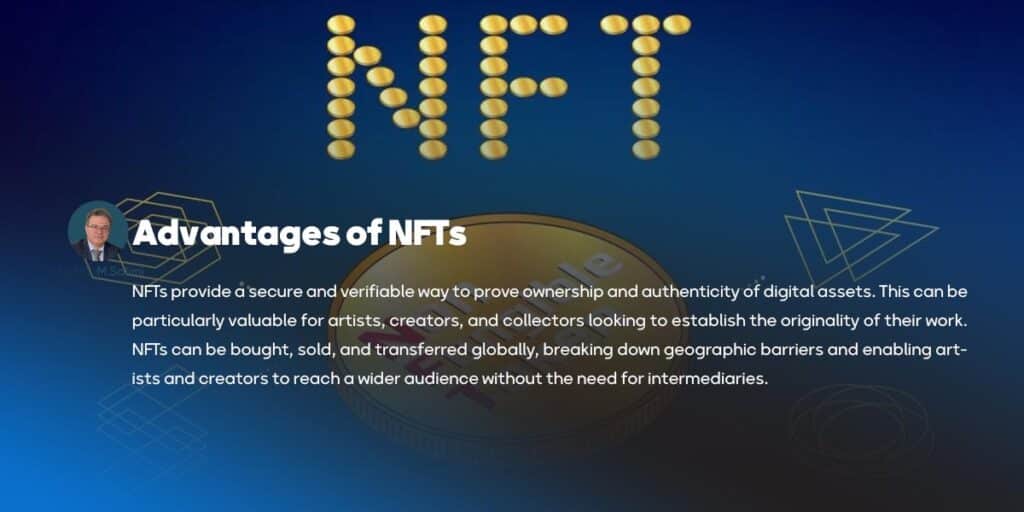
Advantages of NFTs
NFTs provide a secure and verifiable way to prove ownership and authenticity of digital assets. This can be particularly valuable for artists, creators, and collectors looking to establish the originality of their work. Non-Fungible Tokens can be bought, sold, and transferred globally, breaking down geographic barriers and enabling artists and creators to reach a wider audience without the need for intermediaries.
Market Volatility:
The market for Non-Fungible Tokens can be highly speculative and volatile, leading to unpredictable pricing and valuation of digital assets. This volatility can pose risks for both creators and buyers, especially those looking to invest in NFTs for speculative purposes.
Owners or authorized agents can submit real estate assets for tokenization. An expert panel performs a review and validation process, which includes verifying legal documents and evaluating the asset’s value.
Lack of Regulation:
The NFT market is relatively new and lacks comprehensive regulation, leading to potential risks such as fraud, scams, and intellectual property disputes. The absence of clear legal frameworks and industry standards can create uncertainty for participants in the Non-Fungible Token ecosystem.
High Entry Costs:
Minting, selling, and purchasing Non-Fungible Tokens often involve transaction fees and gas costs on blockchain networks, which can be prohibitively high for smaller creators or buyers. These costs can limit accessibility and participation in the NFT market, particularly for those with limited resources.
Copyright and Ownership Issues:
NFTs have raised questions about copyright enforcement and ownership rights, especially when it comes to digital assets that may have been created or shared without proper authorization or consent. Resolving disputes over ownership and intellectual property can be complex and challenging in the decentralized and global nature of the Non-Fungible Tokens space.
Scalability and Technology Limitations:
Some blockchain networks may face scalability issues, such as high gas fees during peak periods of activity, slow transaction times, and network congestion. These limitations can affect the user experience and operational efficiency of Non-Fungible Tokens platforms and marketplaces.
collections. Maintaining adequate cybersecurity measures and protecting private keys is essential to safeguarding digital assets in the Non-Fungible Tokens ecosystem. Despite these challenges, ongoing developments in blockchain technology and the evolution of the NFT market may address some of these issues over time and enhance the overall sustainability and value proposition of Non-Fungible Tokens.
final word
As the Non-Fungible Tokens space continues to evolve and attract a diverse range of creators, collectors, and investors, it is clear that this digital phenomenon is reshaping how we perceive and interact with art, collectibles, and other digital assets. While facing challenges such as environmental concerns, market volatility, and regulatory uncertainties, the promise of NFT technology to revolutionize ownership, provenance, and monetization in the digital realm remains compelling.
As stakeholders navigate the complexities of this rapidly expanding ecosystem, collaboration, education, and innovation will be key in unlocking the full potential and benefits of NFTs for creators and consumers alike. Whether you view NFTs as a passing trend or a transformative force, one thing is certain.


